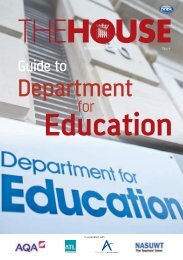Oracy
2fcBkno
2fcBkno
You also want an ePaper? Increase the reach of your titles
YUMPU automatically turns print PDFs into web optimized ePapers that Google loves.
In special schools this may be because multiple members of staff have responsibility for different<br />
specialist areas of speech, language and communication provision. Equally, it may be that staff in these<br />
settings are more likely to see oracy as everyone’s responsibility. One special school teacher says she<br />
thinks that having one person take responsibility might be useful in initially raising the profile of oracy<br />
but that, ultimately ,“I don’t think it should lodge with one person.”<br />
Independent school leaders and teachers,<br />
equally, say that having a single person<br />
responsible for oracy might lead to oracy’s<br />
implementation in silos rather than across<br />
the school.<br />
“A lot of it happens in the everyday engagement with<br />
the teacher. For us it’s not a bolt on, it’s just there,<br />
and it’s what’s expected….<br />
It’s part of the DNA of the school”<br />
Tricia Kelleher, Executive Principal, Stephen Perse Foundation<br />
Teachers are ambivalent about whether or not one person should be responsible for oracy,<br />
with a third (37%) saying they feel one person should be and a little under a third (29%)<br />
saying they should not. (n=906)<br />
Establishing oracy as a whole-school priority<br />
Bec Tulloch is a class teacher at St Ambrose Barlow RC High School in Salford, and leads the<br />
school’s involvement with an EEF-funded trial of the Voice 21 and University of Cambridge<br />
<strong>Oracy</strong> Framework. She explains that while the school has been rated ‘Outstanding’ for many<br />
years, the headteacher and many of the staff believed oracy would enable the school to<br />
enhance its provision. Two strategies paved a way forward:<br />
• Bec ‘championed’ oracy, instigating the school’s involvement with the EEF trial and raising<br />
oracy’s profile among teachers<br />
• The school conducted a full audit, taking into account pupils’, parents’, and teachers’<br />
opinions. The school’s ability to support pupils’ spoken communication emerged as a key<br />
shortfall in its provision<br />
Bec says:<br />
“It’s come from the parents, it’s come from the students, it’s come from the teachers, so<br />
there’s a real sense of us all agreeing that this is something we want to resolve, and that<br />
we as a school community need to think about and look at.<br />
We were floundering … we haven’t got a strong tradition of oral speaking. We had a<br />
strong tradition at our old school of quiet, courteous behaviour … but within that a<br />
sense that the kids were constricted…. Staff are frustrated, I think, [and saying] to me ‘I<br />
want them to talk … I need them to talk to each other, I really need them to debate these<br />
ideas, and they just don’t want to, and so it’s that sense that it’s a skill that we dropped”<br />
Bec Tulloch, Drama Teacher<br />
Bec feels that the <strong>Oracy</strong> Framework will help embed oracy across the school. The school would not be<br />
part of the trial without the support of senior leaders in the first instance. Bec therefore believes that<br />
securing senior support is a crucial first step for schools looking to develop oracy practice.<br />
68




